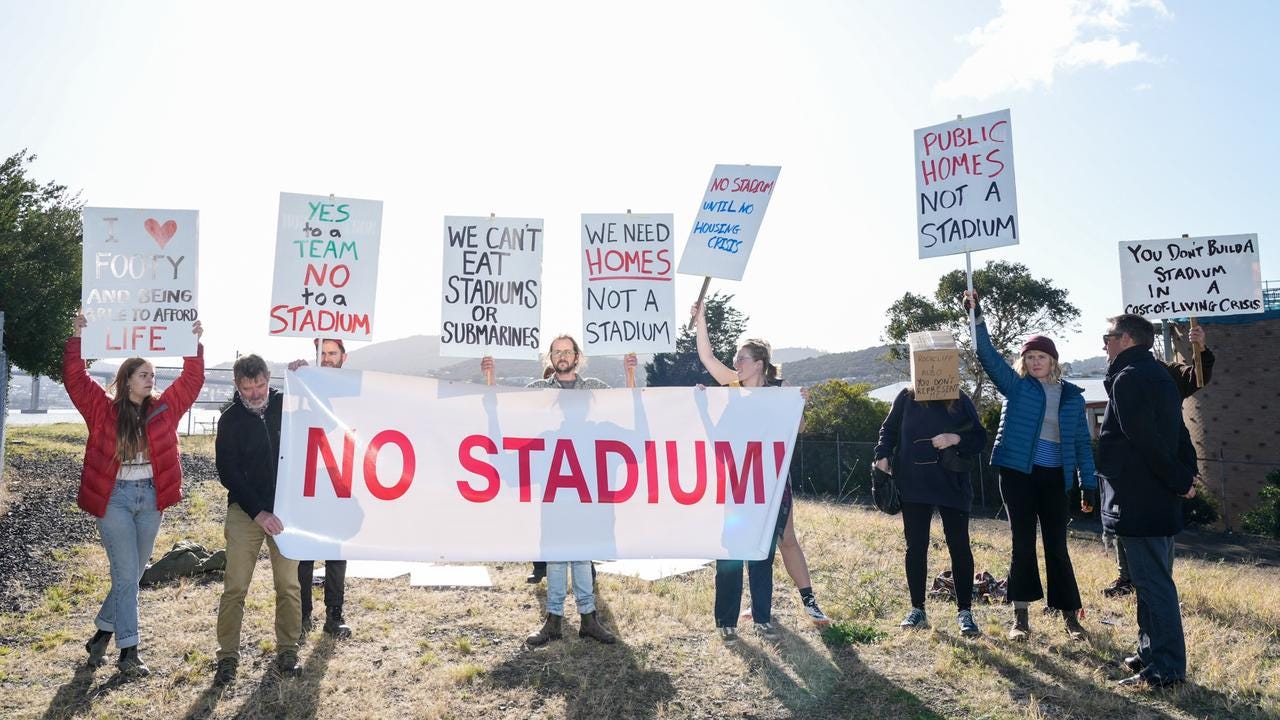Every now and then, the sharpened, dedicated means of halting a monstrous white elephant before its birth can work. The wise suddenly seem in charge, conscious and aware that folly can be averted. This, however, is a rare feat indeed. In Tasmania protests of some magnitude against a proposed stadium for Australian Rules Football are starting to have some effect. These have taken place against a dark backdrop: a persistent, critical housing crisis; the presence of homelessness; concerns about food and energy security, and healthcare.
On 13 May , thousands gathered on Hobart’s parliamentary lawns protesting the $715 million proposal that envisages a redevelopment of the Macquarie Point precinct, a rather disingenuous justification to build a needless 23,000-seat structure on prime real estate using public funds. The package – totalling $745 million, also envisages upgrades for York Park (UTAS Stadium) in Launceston.
A conspicuous figure present at the protests was one of Australia’s more prominent authors, Richard Flanagan. As he wrote in The Age last month, “Tasmania, and its population of 550,000 people, has two stadiums where AFL games are routinely played. Tasmania doesn’t have a stadium problem. It has a housing and homelessness problem.” Rents in Australia’s poorest state have almost doubled over the last five years; affordable properties were elusive to those on Youth Allowance and JobSeeker.
In its myopic vision and scope, the stadium could be said, argues Flanagan, to be “a symbol of government inaction on these issues that blight Australia’s smallest state. In addition to housing, it has Australia’s worst public health system, and, with 50 per cent illiteracy, a public education problem.”
Also present at the protest was federal Tasmanian Senator Jacqui Lambie, who proved to be both colourful and agitated. “Tasmanians,” she declared in her address to the crowd, “have had a bloody gutful over the stadium and you can stick it up your bum.”
In what must surely be considered an act of self-harm, the Tasmanian Liberals also find themselves in a governing minority largely because of Premier Jeremy Rockliff’s edifice fetish. A day before the large protests, Liberal backbenchers John Tucker and Lara Alexander quit the party. As Alexander reasoned, “The proposed shady deal to build a stadium in Hobart has sharply divided the community.” While she did not often agree with her opposite numbers in state parliament – both Labor and the Greens – any amount “upwards of one billion of taxpayers’ money […] should be allocated to essential services such as health and priorities like housing.”
Alexander also took issue with the Premier’s stinginess in not disclosing the full nature of the contracts. If a raid on the public purse on such a scale was going to be done so brazenly, surely a degree of transparency was in order. “He has refused to share details of the contracts he signed with the AFL with his parliamentary colleagues, the parliament, and the community. There is zero transparency or accountability in this decision-making process.”
The two politicians also cited the government’s allergic tendency to ignore transparency and Parliamentary oversight regarding other projects, including the Marinus link and the Battery of Nation project. Be environmental, goes that theme, but go alone, without federal assistance. (By way of contrast, the as-yet-to-be-built stadium is promised $240 million by the federal government.)
Something of a vision problem has captured governments in Australia, one that has seemingly paralysed the cortex of policy making. This is evident in the opinions of the Deputy Premier and Treasurer, Michael Ferguson. While claiming to “respect that not everybody has the same opinion on these projects,” Ferguson was also clear that the government was “determined to get on with it, on the basis that we have significant federal funding which really respected, and I think demonstrated, that the business case was persuasive for Anthony Albanese, our Prime Minister.”
Miraculously, money has been found for such vanity projects as a sporting stadium being used to blackmailing effect by the AFL, for funding a yet unrealised nuclear-powered submarine fleet that will be essentially useless against any adversary. While the stadium is slated to cost under $800 million – and bound to go over – the federal government is topping that amount with $368 billion for sea vessels, all the time arguing that such profligacy will have no impact on the budget. One of the protesters’ themes summed up the indignation against these two projects superbly: “We can’t eat stadiums or submarines.”
To this can be added the disease of sporting privilege and aristocratic snobbery. The Australian Football League has become something of a spoilt, bullying brat, dictating terms to governments and smiting those disloyal to the creed. Forget the working stadia already in place; the fact that Tasmania was receiving the 19th license to play in the AFL and AFL Women’s League necessitated the extravagance of a spanking new facility. No stadium; no team. In doing so, the sporting body has not only brought Premier Rockliff to his knees, but that of Australia’s Prime Minister, Anthony Albanese.
To that end, we can only hope that the likes of Flanagan, the other state politicians in Labor and the Greens, and those tireless representatives at the federal level, MP Andrew Wilkie and Senator Lambie, can finally make those in power see sense. But stupidity, and its occasional sidekick, blindness, remain powerful forces behind the birth of white elephants.





Sporting privilege? Is that the same as excessive protest privilege? Sports is a, good for you. b, widely loved. c, a massive income generator for local businesses.